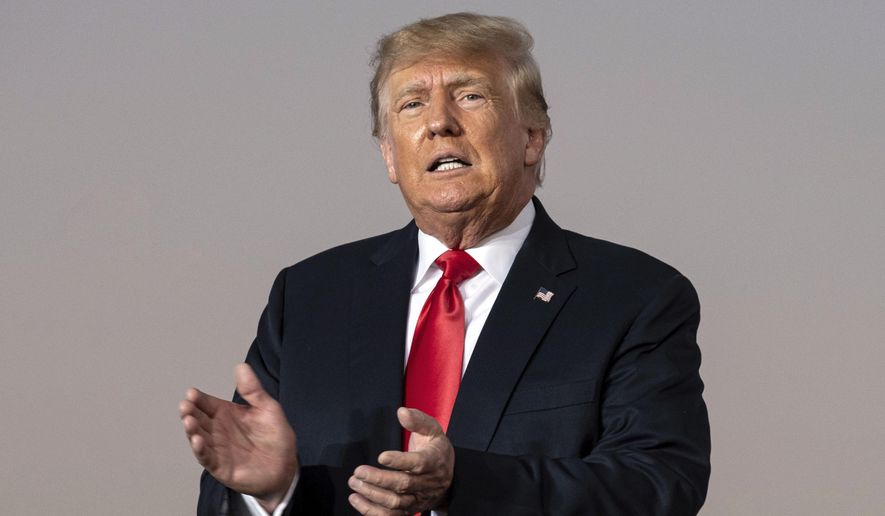The lawyer and law professor who advised former President Trump’s legal team on challenging the 2020 election is facing a complaint over his law license in California this week, and the Supreme Court is also weighing a second legal battle on Friday after attorney John Eastman was banned from speaking at an event due to his conservative views.
Mr. Eastman reportedly advised former Vice President Mike Pence on his options to delay or overturn the 2020 election results on Jan. 6 when he presided over Congress’ certification of the election, according to a new book from Washington Post writers Bob Woodward and Robert Costa. Mr. Eastman then spoke to Trump supporters ahead of the Jan. 6 riot at the U.S. Capitol that temporarily suspended the election certification debate.
A group of legal scholars, some of whom are members of President Biden’s Supreme Court commission examining whether to add new justices to the court, filed a complaint this week with the California bar over Mr. Eastman’s involvement in allegedly challenging the election.
In a letter addressed to George S. Cardona, who as the California chief trial counsel oversees attorney discipline, the group said Mr. Eastman should be investigated for potentially undermining the democratic process.
“Our state bars set standards of professional responsibility for their members to ensure that in their zealous defense of their clients, lawyers also serve as the guardians of the rule of law. We accordingly urge an immediate and expeditious investigation,” the letter read.
It was signed by more than two dozen legal scholars and politicians, including former judges and governors.
“As a member of the California Bar, I’m proud to be part of the group filing a complaint with the state’s bar association against John Eastman, the unprincipled lawyer who worked with then-President Trump to pressure then-VP Pence to overturn the election,” said Laurence Tribe, a law professor at Harvard and member of Mr. Biden’s Supreme Court commission.
Mr. Eastman denied advising Mr. Trump or Mr. Pence directly to overturn the election in a phone interview with The Washington Times on Wednesday. He said he worked with lawyers and drafted two memos over the question of whether or not Mr. Pence had the authority to throw out contested electoral votes. He said he viewed it as an open legal question, but thought the argument that Mr. Pence had the power was weak.
“I was the one that advised [that Mr. Pence] didn’t have this more aggressive authority that had been floated,” Mr. Eastman said. “I’m the one that said, ’No, you don’t have that authority.’”
Mr. Eastman said he expects the state bar will recognize the complaint as a “politically-motivated and defamatory attack” and dismiss it.
“But if not, I look forward to responding in full to every false assertion,” he said.
The complaint isn’t the only legal conflict in which Mr. Eastman finds himself involved this week.
On Friday, the Supreme Court justices will gather for a private conference and decide whether to hear a case involving Mr. Eastman’s First Amendment rights.
The case, Pasadena Republican Club v. Western Justice Center and the City of Pasadena, involves the decision by the Western Justice Center, which had authority over city-owned property, to cancel an event hosted by the Pasadena Republican Club on April 20, 2017 because Mr. Eastman was a speaker.
The GOP group had hosted evening events at the building in the past, but the Western Justice Center banned the group from further renting space.
According to court papers, the Pasadena Republican Club was notified three hours before the event that it would not be allowed to host Mr. Eastman at the building due to the attorney’s conservative views on social issues.
“We learned today that [Dr. Eastman] is the president…of the National Organization for Marriage (NOM). NOM’s positions on same-sex marriage, gay adoption, and transgender rights are antithetical to the values of the Western Justice Center,” the email notice read.
The Pasadena Republican Club sued, arguing that its constitutional rights were violated.
Lower courts sided with the Western Justice Center and the city, prompting the GOP group to ask the high court to review the case. It argues that the viewpoint discrimination exercised against it ran afoul of the First Amendment.
“There clearly is viewpoint discrimination,” Mr. Eastman said, adding the case shows state action and censorship.
Tom Caso, an attorney representing the Pasadena Republican Club, confirmed the case is up for review this week with the justices, but he said it does not focus on Mr. Eastman.
“At this stage of the proceedings, the case does not concern John Eastman at all, but considering that the Western Justice Center boasts the involvement of a number of state and federal judges from California, the timing of the letter to the State Bar so long after the events noted in the letter certainly seems to be an odd coincidence,” said Mr. Caso, who is a longtime friend of Mr. Eastman.
Mr. Caso also said he taught professional responsibility and doesn’t believe the California bar complaint suggests any basis for discipline against his friend and colleague.
“It appears nothing more than [an] attempt to use government to punish a political opponent,” he said.
The Western Justice Center argued in court papers it couldn’t be liable for violating constitutional rights because it is a nonprofit, not a state actor, asking the justices not to review the dispute.
Attorneys for the Western Justice Center and the city did not immediately respond to a request for comment.
• Alex Swoyer can be reached at aswoyer@washingtontimes.com.




Please read our comment policy before commenting.